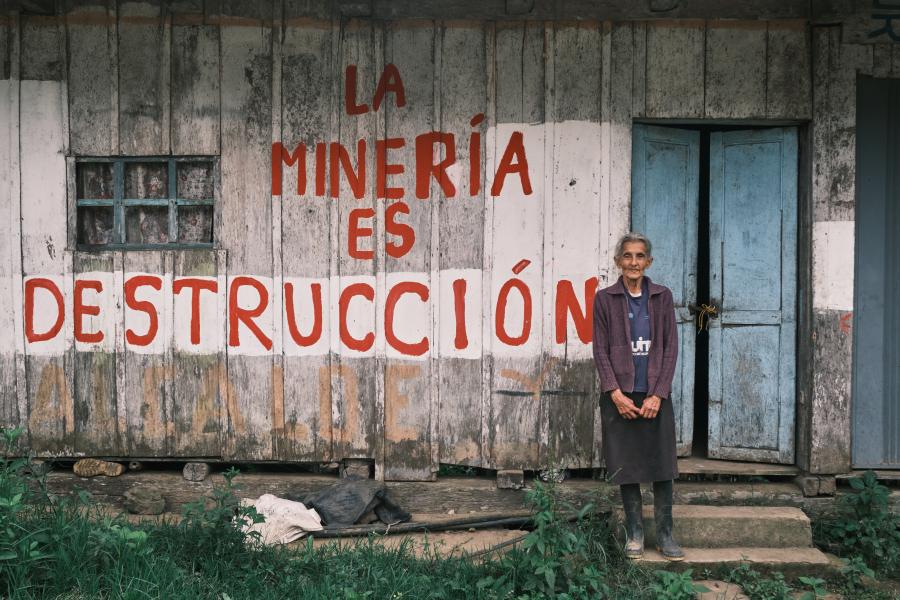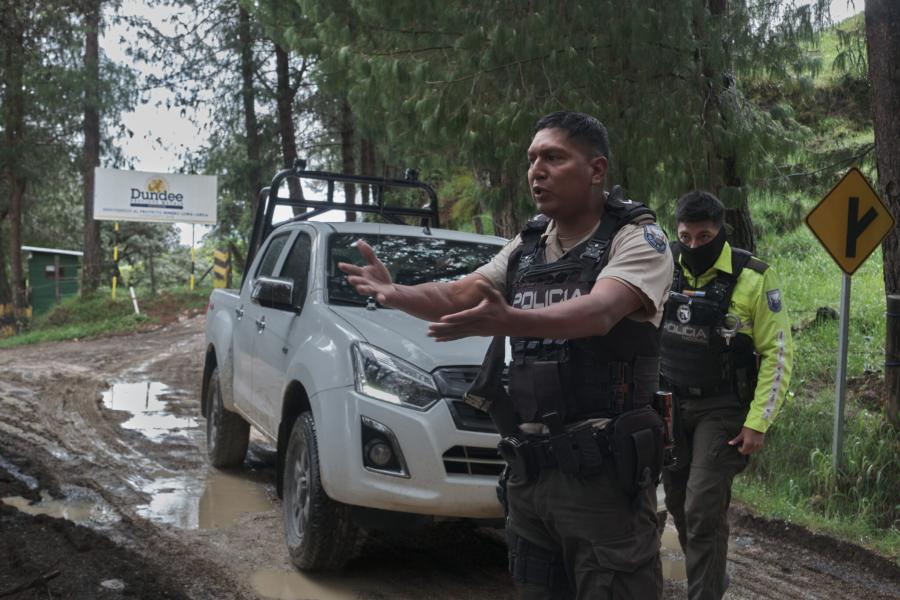One of Cultural Survival's priorities in the area of project support is to provide funding on a limited scale to Indians attempting to form ethnic organizations or federations for the purpose of directing and controlling their social and economic development. The Federation of Indian Organizations of the Napo, FOIN, is an ethnic federation representing the interests of approximately 25,000 Quichua Indians of the Upper Napo River in the low eastern foothills of the Andes within the Oriente region of Ecuador. Cultural Survival, jointly with OXFAM-UK, has provided them with core support since 1982. This article briefly describes the background to the formation of FOIN and the organization's evolution from its inception in 1969 to the present.
Since the 1970s, ethnic federations in the Amazon region of Latin America have proliferated. Richard Chase Smith describes the formation of ethnic organizations (as opposed to peasant unions or, more recently, indianist organizations) as taking place in areas where indigenous peoples have, until recently, had little or no contact with the national society and therefore still retain a strong sense of ethnic identity. (The ethnic federation is a form of political organization which draws strength from, and at the same time reinforces, the group's particular ethnic identity).
In the Ecuadorian Oriente, as in the Amazon regions of other countries in South America, it was the combined threat to their traditional territory, the land base essential to their cultural and physical survival, and to their ethnic identity posed by the Ecuadorian government's policies to develop its Amazon region and, in the process, assimilate indigenous inhabitants into national mainstream society, that spurred these various indigenous peoples to meet, organize and form ethnic organizations or federations. Today, the Ecuadorian Oriente has some of the most well-organized Indian political organizations in the hemisphere.
FOIN was formed in the small city of Tena in Napo Province, in 1969, at a meeting of Quichua leaders concerned about the pressures on their communities' lands and resources produced by the presence of ever-increasing numbers of colonists, workers and entrepreneurs. Between 1962 and 1980, the Oriente region's non-Indian population increased from less than 5,000 to around 70,000. Deforestation from large-scale timbering, petroleum exploitation, squatter colonists encroaching on Indian lands, water and air pollution from oil spills, pesticides and the processing of African Palm, land speculation, and recently, huge African Palm plantations have brought the threat to Indian lands and culture to crisis proportions.
From the outset, FOIN's primary objective was to resolve the problem of land tenure. Its working program was to consist of: 1) organizing communities into centros, comunas or asociaciones to help them obtain the official status needed before land titling can take place, and following that, negotiating with government agency officials from IERAC, the Ecuadorian Institute of Agrarian Reform and Colonization, to obtain legal title to communities' lands; 2) training community leaders in order to strengthen community organization; 3) educating and alerting community members about the problems and threats they face; 4) through courses and seminars, teaching community members agriculture and livestock raising techniques, resource management and basic administration and accounting (managerial skills essential for them as they become further linked to the political and economic life of the national society); 5) instilling and promoting cultural pride among Quichua people to increase social cohesion of the group.
FOIN's organizational structure is similar to that of the Shuar Federation in being comprised of centros. Self-identifying residential clusters or communities, and groups of centros, or asociaciones (each with 3-10 centros.) But unlike them, FOIN includes among its base groups cooperatives of indigenous workers, such as artisans and an association of river transporters.
FOIN's development and growth was hampered in its early years for a number of reasons. In many areas, the Napo included, religious missionaries, at the State's bidding, undertook the task of integrating indigenous populations into the national society. The Summer Institute of Linguistics also played an important role in this effort. Ironically, it was often Protestant and Catholic missionaries who, for a variety of reasons, encouraged the formation of ethnic federations. Such was the case, for example, in the formation of the Shuar Federation in 1964. FOIN, on the other hand, not only lacked the support of the local mission under the Josephines, but won the mission's outright opposition. Consequently, FOIN initially was forced to compete with mission-supported Indian organizations: the Federation of Catholic Indian Organizations of the Napo, FOCIN, and the Association of Evangelical Indians of the Ecuadorian Amazon, AIEN (since the 1980s, this latter organization has begun to work more closely with FOIN).
In the early 1970s, FOIN received from a European aid organization a grant of a size that it had never managed. Managerial problems lost them not only their funding, but, more importantly, the confidence and support of much of their constituent communities. After a period of several years of near collapse and little activity. Cultural Survival and OXFAM-UK at FOIN's request agreed to provide modest core support. The two funding organizations, while concerned about FOIN's earlier mismanagement of funds and its internal divisions, saw the great need in the area for a truly representative Indian organization, and agreed to provide core support to FOIN on the condition that they keep extremely careful accounts of their activities and expenditures, and provide regular and detailed narrative and financial reports. The funds enabled the organization to rent a small office in Tena, Napo, to visit government officials and Indian organizations in Quito, hold meetings with community representatives and delegates, and travel regularly to member communities.
This arrangement, combined with the funding organizations' frequent visits to the group, ensured Cultural Survival and OXFAM that FOIN was fulfilling the terms of their agreement. More importantly, it helped FOIN's leadership to gain the managerial and administrative skills necessary for running such an organization, and it restored the affiliated communities' confidence in the federation's abilities.
FOIN's progress since 1982 and its reemergence as a regional organization have been impressive. It has managed to incorporate most of the Quichua communities in the region, helping them to obtain the legal status necessary for titling to take place. FOIN's affiliates now number 82. In July 1984 FOIN was granted personería jurídica (legal corporate status), an important accomplishment as it demonstrates the government's recognition of it as an official representative organization, and allows it to obtain bank loans and conduct other legal activities. FOIN has negotiated successfully with government officials to obtain aid from the Ministry of Social Welfare to construct a two-story building in Tena to serve as an office headquarters, a meeting space, a medical clinic and a temporary residence for visitors from distant communities. Funds from the Inter-American Foundation have helped them to equip the offices and to set up a carpentry workshop. FOIN is now also engaged in a project funded by SWISSAID to research the traditional indigenous health care system.
The federation is still attempting to resolve the concrete problems of its member communities relating to production, consumption, marketing, education, health, legal status, culture and language. Much of their time is now spent confronting problems concerning the development of African Palm plantations. The federation is rapidly maturing, though, and now that many communities have received organizational training, FOIN has begun to focus more attention on plans for economic development and resource management. In 1985, Cultural Survival and OXFAM-UK increased support to FOIN based on the success of the first funding period. FOIN's present program consists of continued basic organization and leadership training with isolated, newly incorporated communities, and a coordinated economic development and resource management program for those communities who have already received organization training and have asked FOIN for more advanced assistance. Both kinds of work are essential for FOIN to continue to build a strong and unified set of communities to defend their land rights and obtain a sustained yield from their territory in the face of increased road building and agribusiness initiatives.
Article copyright Cultural Survival, Inc.



